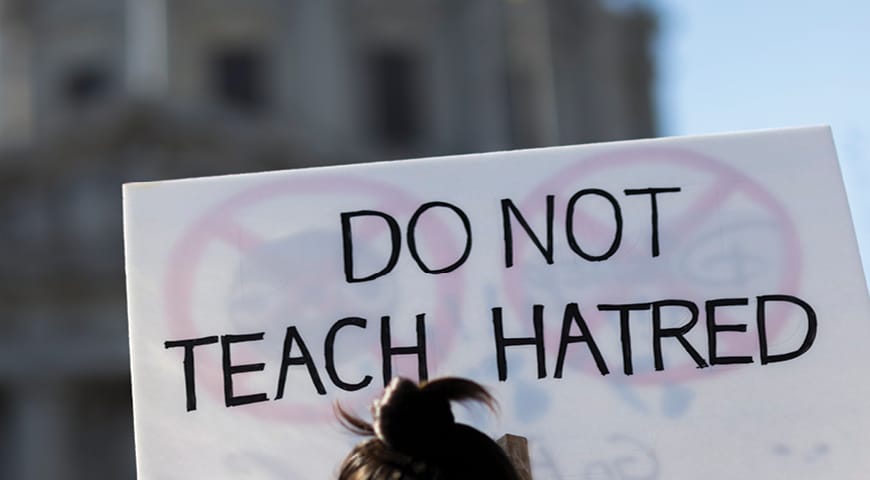I’ve been hearing the term “systemic racism” used more and more lately, and I’m not sure if I agree with what I am hearing. Can you define what systemic racism is? As I understand, systemic racism means that people (White people in particular) are brought up to be racist through institutions such as schools, churches, organizations. I am a White woman in my 60s and don’t feel that I was brought up to be racist or that the community where I grew up purposely tried to encourage me to feel hatred toward or superior to another race of people.
I realize that racism exists, but I have an issue with the term systemic racism. Instead, I believe that racism is more familial in nature and is passed from one generation to another within the family unit. It’s very upsetting to me and to many White people to be told that we are inherently racist when we try to be tolerant and loving toward others, regardless of their race or ethnicity.
One last point: Isn’t calling White people inherently racist actually a form of racism?
Thanks for writing about a subject crucial to the present and future of our country and world. The key word here is systemic, that is, not attracting much attention because it seems perfectly normal—perhaps something like saying something perfectly obvious, for example, “Water is wet.” Systemic racism seeks to stay under the radar, simply reflecting “what everyone knows” or a very twisted definition of “normal.”
The opposite would be the blatant racism of a KKK rally, the 1955 murder of the teenage Emmett Till for allegedly flirting with a White woman, the 1921 race massacre in Tulsa, Oklahoma, and the 20th-century lynchings so common they were eventually no longer reported in US newspapers.
I think that it was during the trial of Adolf Eichmann in Israel in the 1960s that Hannah Arendt coined the term “the banality of evil.” This approach is certainly reflected throughout The Screwtape Letters, the C.S. Lewis classic written during World War II. Satan tries to make sin look perfectly normal and God’s ways crazy. “Systemic racism” names a reality. Only you know how much it describes the assumptions of the family, social groups, and church in which you grew up. I’m glad that you were not taught to hate people of any race, religion, or ethnicity. Unfortunately, too many people were.
In some places, the Catholic Church in the United States desegregated schools, hospitals, and other institutions before the landmark 1954 US Supreme Court Brown v. Board of Education ruling. In other places, the Church followed that lead—but always with great resistance from some Catholics and the general public. In 1963, Our Lady of Good Harbor’s parish school was firebombed the day before it was to open as an integrated school. It never reopened. I knew the friar there who received death threats from people opposed to this change.
Racism can be a conscious choice, such as in the examples cited above. More commonly, however, it is a sin of omission (failing to challenge attitudes or actions that degrade certain groups of people because of their race or ethnicity). All over the world, racism may be the most frequent sin never acknowledged as a sin. Blatant racism goes unchallenged wherever systemic racism is regarded as “normal.” I haven’t told individuals or groups that they are racist; I have only said that systemic racism exists. No one is inherently racist. “You’ve Got to Be Taught” is the title of a powerful song in the musical South Pacific. Such teaching can be direct or more often indirect. In some situations, “Silence implies consent,” which is how we recognize negligence (for example, when someone has witnessed a criminal action but refuses to testify about it in a court of law).
Jesus teaches us to avoid sins of commission and those of omission.









2 thoughts on “What Is Systemic Racism? ”
While I largely agree with Brother McCloskey, I think it is also important to acknowledge that the idea of systemic racism is almost exactly the opposite of what the questioner initially thought. That is to say, it refers to the racism inherent in various social systems independently of the racial values and beliefs of those working in and under those systems. For example, the criminal justice system in the U.S..
The idea of systemic racism is that regardless of whether or not there are, or even if there were no racist police, judges, lawyers, or anyone else working in the system, the system itself is structured in such a way that it disproportionately targets people of color. So in essence, we can have racism even without the presense of racists, simply because of the way we’ve organized a particular social structure.
Part of the issue with the term “systematic racism” is it is political speech made to be purposely vague and never accurately or completely defined by those weilding it. And since institutions don’t run themselves, the claim of systemic racism, DOES suggest those within it are actively acting on racial biases.
To be sure, racism does exist. And with the example of our current criminal justice system, it’s a fact that some working within it harbor
a discriminatory attitude,
and some act on their biases.
That cannot be denied. But contemporary American society has rejected racism as a legitimate attitude.
That attitudinal
change can be seen through the law, Congress has passed numerous laws to bar racial discrimination in public or
private decision-making. Atop that, today’s criminal justice institutions are not anything like our grandparent’s
systems. There are numerous legal and political safeguards to prevent racism from arising, determine whether it has occurred nonetheless, and prevent it from having an effect on a defendant.
Racism and crime are different forms of socially aberrant, harmful, and prohibited conduct.
The idea that the latter is the inevitable product of only of the former or that
society should ignore all or some categories of the latter to combat the former is logically incoherent,
socially corrosive, and certain to be self-defeating if the goal is to reduce both.